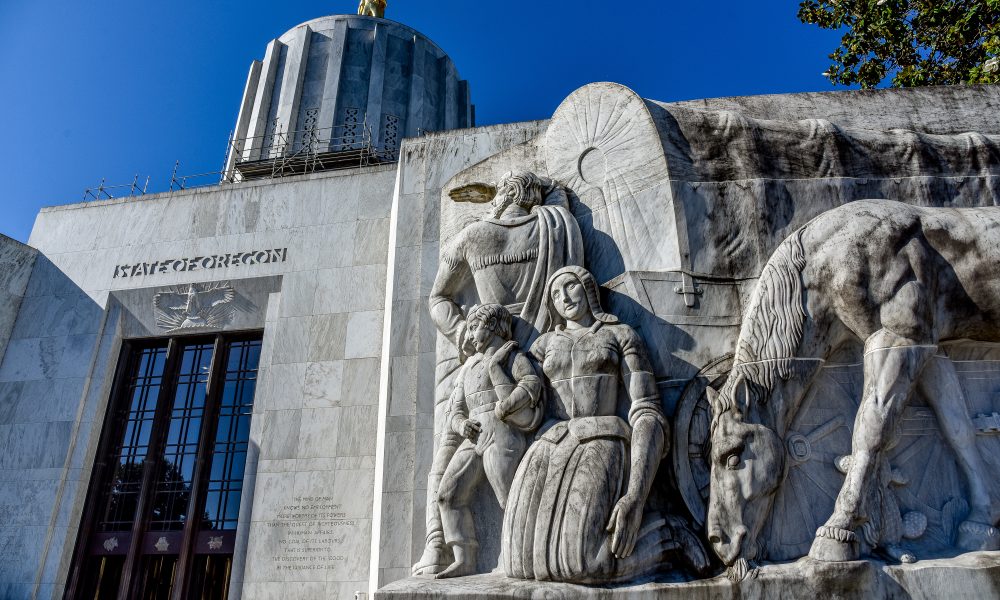
The Oregon State Capitol building (Salem Reporter file photo)
In what was a contentious hearing by Oregon standards, state lawmakers grilled a right-wing think tank statistician who testified that the climate changed the day the earth was “born” and media and government are generating hysterics over the matter.
Kevin Dayaratna is a mathematician for the Heritage Foundation, but said his presentation reflects his personal beliefs. He was among the witnesses Tuesday before the Joint Committee on Carbon Reduction, co-chaired by Senate President Peter Courtney and House Speaker Tina Kotek.
The hearing that centered on potential “cap and trade” legislation meant to lessen the amount of greenhouse gasses emitted in the state.
Cap and trade has become perennial legislation since 2015, but advocates hope the committee will draft legislation that will get through the Oregon Legislature next year and pass into law. After taking October off, the committee will convene in November and December.
Cap and trade would limit on carbon emissions for the state’s biggest polluters – those emitting at least 25,000 metric tons of greenhouse gasses. A 2017 report showed polluters overall were emitting about 60 million metric tons per year.
As proposed, the cap would decrease over time. To make sure they aren’t penalized, those large polluters would buy credits to cash in if they surpass pollution regulations. Those under the cap could sell their credits to companies who are over the cap.
It’s a system currently working in California and several Canadian provinces. Most jurisdictions are on the same marketplace, managed by Western Climate Initiative. Oregon would likely join that.
On Tuesday, officials from Western Climate Initiative and Quebec followed Dayaratna to explain how the policy has worked in recent years. The hearing was among the most popular at the Capitol this week, with viewers spilling into two overflow rooms. Many audibly scoffed as Dayaratna posited that the committee should instead be focused on getting Oregonians the cheapest energy possible.
Cap and trade policy, he said, would “kill thousands of jobs, make families poor and have a negligible impact on climate.”
When asked about increased extreme weather, Dayaratna said the narrative purporting an increase in frequency and severity of droughts and hurricanes are “myths propagated by the mainstream media.”
Dayaratna was invited by state Sen. Fred Girod, R- Stayton. Girod acknowledged the controversy of bringing him to the Capitol, and asked Dayaratna to explain he wasn’t representing Big Oil.
Dayaratna said that the Heritage Foundation gets a minimal financial support from corporations. However, a significant amount of funding for the organization has often come from the Koch brothers, who own Koch Industries. Koch Industries manufactures and refines petroleum, among other things.
Girod twice thanked Dayaratna for traveling from the East Coast for the hearing, saying the committee was “blessed” to have him provide his perspective.
The Quebec officials painted a different picture. The province implemented cap and trade in 2013, and the following year partnered with California to trade credits. Cap and trade regulates Quebec companies responsible for 85 percent of the province’s greenhouse gas emissions, officials said.
But the regulations haven’t put a chokehold on industry. Officials testified that the regulation increased competition, giving the province its strongest economy ever and a 5.6 percent unemployment rate, third lowest in Canada.
Past Oregon legislation, including a 2017 bill that died despite 33 co-sponsors, indicate the policy would also include an investment element. In a 2018 bill, credits were projected to have a floor of $16 per metric ton, and then increase each year due to inflation. That money would go into a fund to be be invested in projects combatting emissions or preparing the state for climate change.
The projects could range from a citizen applying for funds to put solar panels on their home to a city looking to build a light rail train. The state could also use some of the money for things such as wildfire mitigation.
Reporter Aubrey Wieber: [email protected] or 503-575-1251. He is a reporter for Salem Reporter working with the Oregon Capital Bureau, a collaboration of the Pamplin Media Group, EO Media Group, and Salem Reporter.









